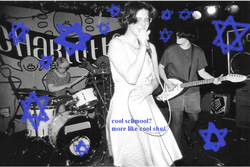Get Angry: Carrie Brownstein and the Legacy of Riot Grrrl
Sleater-Kinney’s third studio album, Dig Me Out, combines a rock sensibility with assertive feminist lyrics and harsh, passionate vocals. The lead single off Dig Me Out was “Little Babies,” a critique of the traditional societal role of women as mothers and housewives. The delivery is mocking, as if members Corin Tucker and Carrie Brownstein are sneering at the absurdity of it all. “I’m the water, I’m the dishes, I’m the suds” Tucker sings. “I will comfort, make you clean, help you cope/When you’re tired feeling helpless/Come inside I am the shelter.” Then the song bounces into the chorus—four lines of catchy, frustrated protest.
“Little Babies” is a classic example of one of riot grrrl’s most essential legacies—thoughtful, angry, and feminist lyrics. Riot grrrl, an underground feminist punk movement, began in the early 1990s in Olympia, Washington, when a group of women held a meeting to discuss sexism in the punk scene. That meeting grew into riot grrrl. Riot grrrl’s method of channeling anger through music, zines, and publications was highly effective, and their music still strikes a chord in the hearts of young feminists today. It is the musical antidote to our troubling times, to attacks on bodily autonomy, to rising LGBTQ+ hate, to more and more laws and policies that hurt women.
Sleater-Kinney, formed in 1994 by Carrie Brownstein (born to a Jewish family in Seattle) and Corin Tucker, came out of the riot grrrl movement. They were soon joined by Jewish drummer Janet Weiss. Sleater-Kinney’s music has never been explicitly Jewish, but I see Judaism in it anyway.
Judaism’s core teachings of tikkun olam (repairing the world), social justice, and equality are what the riot grrrl movement was all about. Sleater-Kinney is no different. Their songs deal with social issues, politics, and gender roles, their lyrics fueled by the riot grrrl culture from which they emerged. “Sleater-Kinney are brave enough and strong enough to make a difference and get the word out,” said Carrie Brownstein in the early 2000s. That push to make a difference and spread the word has been a central part of my Jewish upbringing. Perhaps that’s part of the reason why I’m so drawn to riot grrrl.
Almost immediately upon my introduction to the genre, I was hooked. Riot grrrl is at once rousing and soothing, managing to both validate all of one’s frustrations with the world and provide a space in which to let them go, comforted by the knowledge that there are others feeling the same way.
In the 1990s, the riot grrrl movement marked an unofficial beginning to third-wave feminism. A new way of thinking about feminism was created by bands like Sleater-Kinney, Babes in Toyland, Bratmobile, and Bikini Kill. Their message can be summed up in an undated Bikini Kill tour flier, which reads, “BECAUSE in every form of media I see us/myself slapped, decapitated, laughed at, objectified, raped, trivialized, pushed, ignored, stereotyped, kicked, scorned, molested, silenced, invalidated, knifed, shot, choked, and killed. … BECAUSE a safe space needs to be created for girls where we can open our eyes and reach out to each other without being threatened by this sexist society and our day to day bullshit. … BECAUSE I am tired of these things happening to me; I’m not a fuck toy. I’m not a punching bag. I’m not a joke.”
Everything on that flier still feels incredibly relevant. Riot grrrl still feels incredibly relevant. It was and is about finding a voice, letting our anger out, giving feminism a space to be really, truly angry. With explicit, hard-hitting lyrics, riot grrrl allowed women to share their experiences in an intense, judgment-free way. It was loud and it was furious. “We told stories from a female perspective in a way that was unapologetic and unafraid of its own voice,” Brownstein said in 2015.
Women have been socialized for centuries to be docile and submissive. We’ve been taught that we are inferior, that we are the servants of men. We’re still fighting for equality, and crucial in that fight is our anger, because anger is a key part of any and all social change. In this world of sorrows, disappointments, tragedies, injustices, and violations, anger can’t be contained or hidden away. It bursts forward, commanding the attention of all who come near. Activism, to me, is taking this anger and channeling it toward tikkun olam.
This past summer, I walked out of school with dozens of my classmates to participate in an abortion rights rally organized by Rise Up 4 Abortion Rights, almost exactly a month before the Supreme Court overturned Roe v. Wade. There was anger all around me, and it felt uniquely powerful. Surrounded by women shouting at the top of their lungs, voices cracking with the force of their screams, I felt the power of our contemporary feminist movement.
This is what I wish I saw more of. The #MeToo movement, the 2017 Women’s March, and the abortion rights rallies that happened all over the country both before and after the reversal of Roe v. Wade were all the more influential because of the rage that fueled them. But I often feel that other parts of the contemporary feminist movement, especially those not primarily associated with protests and rallies, are lacking some of that force.
I wish that we were hearing and seeing more of the raw anger that riot grrrl showcased. Music, of all genres and varieties, has proven itself time and time again to have a huge impact, different from any other medium. It shouldn’t be dismissed as an unimportant tool of social action. Riot grrrl proved that it is effective. It shows that the music written as part of one movement can be just as influential and important decades later.
Sleater-Kinney continues to use their music to inspire social change. Carrie Brownstein continues to write uncompromising, important lyrics. Riot grrrl lives on, and reminds us that anger is a tool that should be utilized in order to repair the world, in order to practice tikkun olam.
This piece was written as part of JWA’s Rising Voices Fellowship.








Well written!
Ava is getting her point across about Music. It has always proven to have a big impact on all generations. It is bye far a medium that is enjoyed and listened to by many. It should be used as a tool for social action !!!